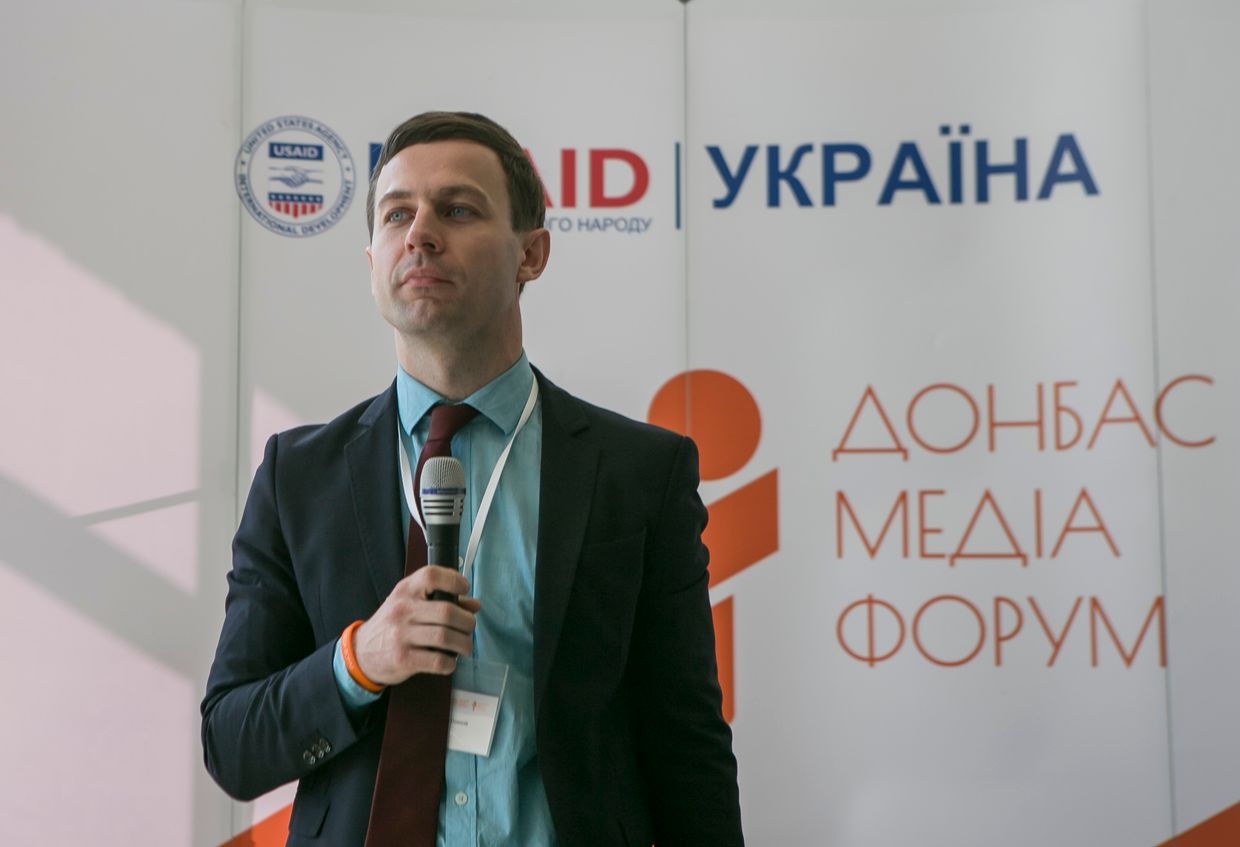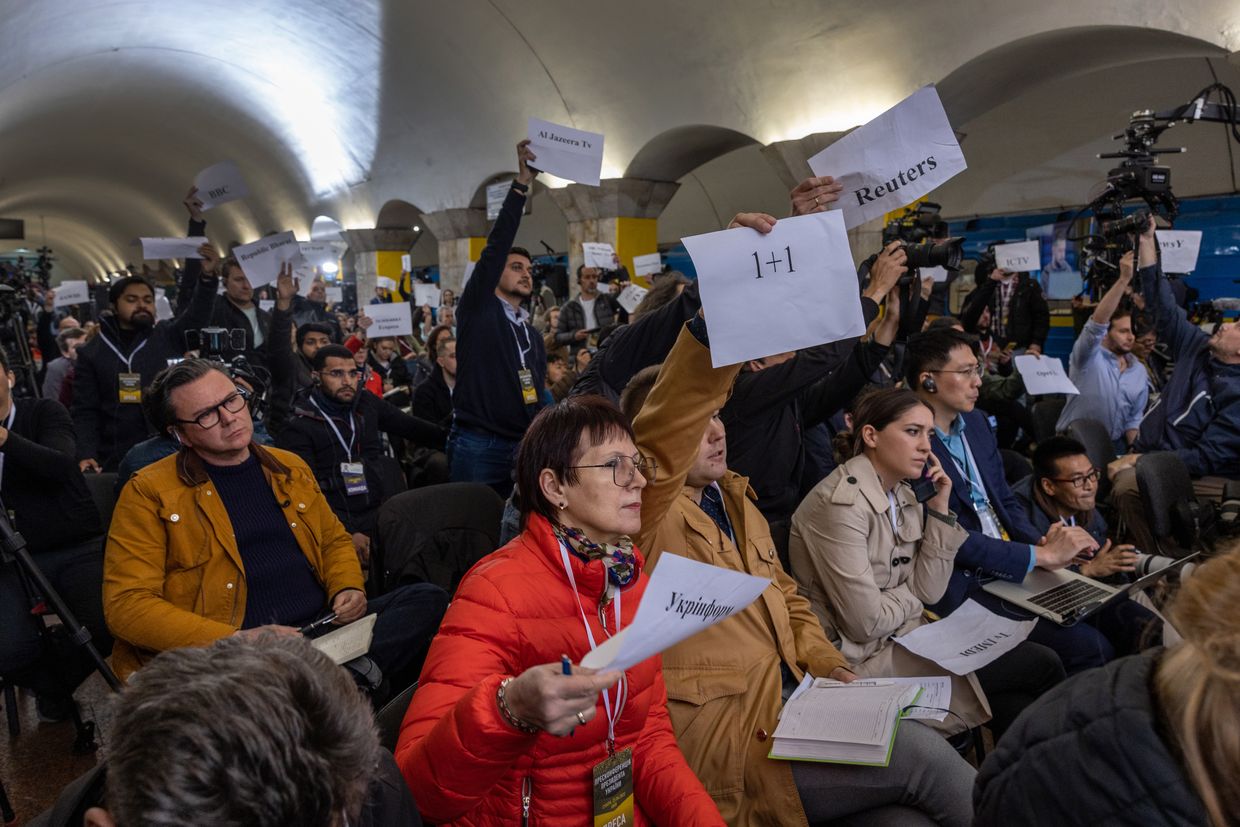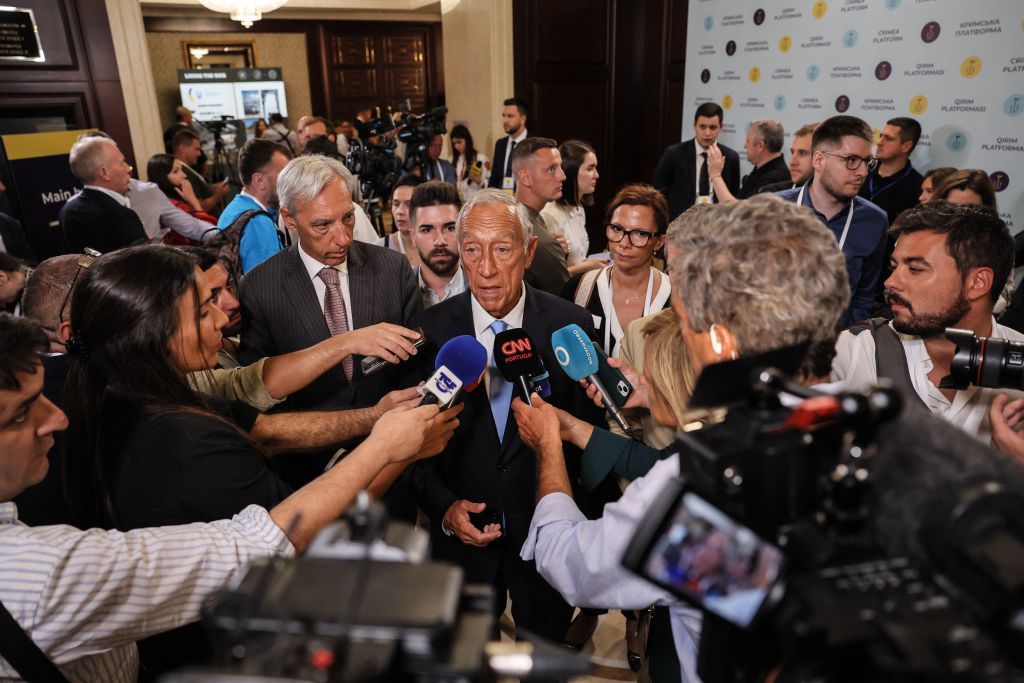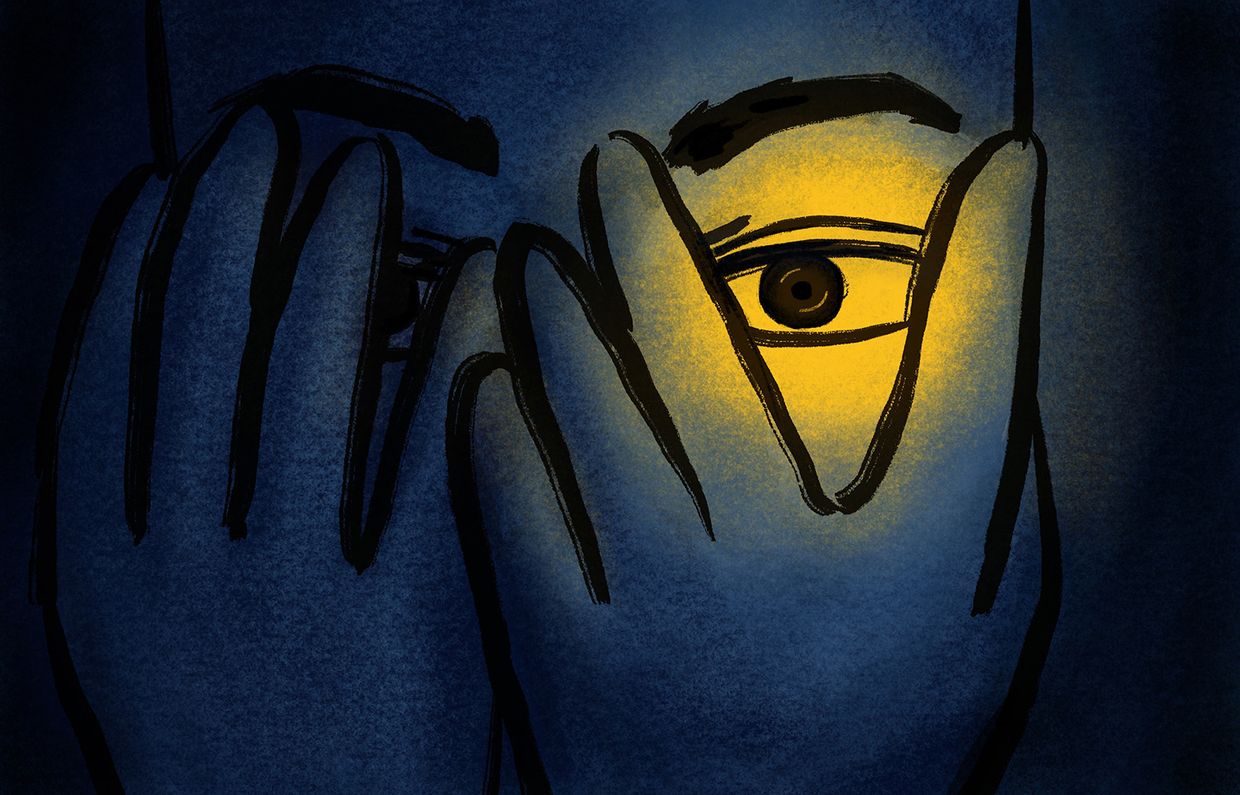Ukrainian journalists report continued pressure, censorship attempts as previous cases remain unsolved

President Volodymr Zelensky walks into the press conference at the "Ukraine Year 2024" forum in Kyiv, Ukraine on Feb. 25, 2024. (Paula Bronstein./Getty Images)
Ukrainian journalists and media watchdogs are continuing to voice concerns over declining press freedoms as their country’s army fights on more than two years into Russia’s full-scale invasion to protect the future of the democracy.
Months after attacks on investigative journalists provoked a public outcry and condemnation, media still face different forms of pressure from authorities, according to Ukrainian editors and press freedom watchdogs interviewed by the Kyiv Independent.
The most significant recent cases include censorship attempts and political interference at a state news agency, allegations of journalists being drafted for the war as retribution, and the de facto withdrawal of a Ukrainian public broadcaster from the controversial state-imposed and controlled television news programs called telemarathon.
Independent Ukrainian media also report that the military command is hindering their front-line coverage and that they lack access to key government officials. President Volodymyr Zelensky has given only a handful of interviews to Ukrainian media since the start of the full-scale invasion.
Martial law imposed after Russia launched its full-scale invasion allows the state to seize or control any assets if crucial to the military effort, including media. But the justifications for such actions are vague and concern looms high that the measures can be abused without due cause and oversight.
While Zelensky has publicly condemned pressure on the media, Oleh Tatarov, a top official from his administration, may be behind at least one attack on journalists, a senior official told the Kyiv Independent.
And with authorities making no progress in probing some of the most high-profile cases where media freedoms have been jeopardized, concern looms not only about a lack of political will at the top but also about authorities purposefully silencing journalists.
‘Undesirable’ speakers
In late May, Ukrainska Pravda, a major Ukrainian independent media outlet, published an investigation revealing that Oleksii Matsuka, until recently the head of state news agency Ukrinform, distributed a list of banned speakers to his reporters. The list branded as "undesirable" opposition politicians, civil society activists, and other potential critics of the authorities, such as "residents of the region who have not had a water supply for a long time."
Ukrainian media professionals have compared this incident to the large-scale censorship campaign under former pro-Russian President Viktor Yanukovych. Since Yanukovych was ousted by the EuroMaidan Revolution in 2014, press freedom has improved drastically, with the emergence of many new independent media outlets, a public broadcaster and legislation adopted to align the country's media with EU standards.

Some of Ukrinform’s employees have rebelled against interference in their editorial independence by seeking support from media watchdogs and Western embassies.
In May, after months of tensions, Matsuka was replaced with former military spokesman Serhii Cherevatyi. Zelensky’s office in comments to Ukrainska Pravda has denied wrongful interference in Ukrinform’s work, while Matsuka refused to comment on the origins of the guidelines he distributed and his links to the president’s administration.
Zelensky’s office has not yet publicly commented on the accusations of censorship.
“The government is just ignoring this topic,” Sevgil Musaieva, Ukrainska Pravda’s chief editor, told the Kyiv Independent.
Matsuka did not reply to the Kyiv Independent’s request for a comment.
Ukrainian and international media organizations have expressed concerns about Cherevatyi's appointment, citing his lack of experience in managing media and potential conflict of interest as a military serviceman in charge of a national news agency.
In a comment to the Kyiv Independent, Cherevatyi argued that his military status did not disqualify him from the role, saying, "You either follow the law or you don't."
"All the duties and legal requirements applicable to my predecessors also apply to me,” he said. “The only thing distinguishing me is that I can be called back to the Armed Forces very quickly."
Oksana Romaniuk, the director of Ukraine’s Institute of Mass Information, a media watchdog, said that merely changing the head of Ukrinform is unlikely to restore its editorial independence. She stressed the need for the news agency to modernize its "outdated statute" and undergo a large-scale reform similar to Suspilne, a public broadcaster that has an independent supervisory board.

Cherevatyi said he "wouldn't hurry" with reforming Ukrinform, "especially during the war, considering what resources are available to the enemy," but mentioned ongoing discussions with journalists and other stakeholders on preventing censorship in the future.
Shortly after the Kyiv Independent's conversation with Cherevatyi, Ukraine's acting Culture and Information Minister Rostyslav Karandieiev announced that his department was preparing changes to Ukrinform's statute that would allow for the creation of a supervisory board.
Meanwhile, one of the Ukrinform journalists who publicly revealed the guidelines for avoiding “undesirable” speakers said he received a draft notice calling him up for military service immediately after. He said he didn’t know if it was a coincidence or retribution for his whistleblowing.
It's still unclear who authored the guidelines on "undesirable" speakers that were distributed among the Ukrinform reporters.
Yaroslav Yurchyshyn, head of parliament's freedom of speech committee, requested for the Prosecutor General's Office to assess whether there are grounds for a criminal investigation of censorship at Ukrinform. He told the Kyiv Independent that his request was transferred to the National Police. As of July 3, no law enforcement agency has opened an investigation into censorship attempts at Ukrinform, according to Yurchyshyn.
Public broadcaster breaks away from telemarathon
In May, Ukraine’s public broadcaster Suspilne announced that it would launch its own news broadcasting, separate from the controversial “telemarathon,” also known as "Yedyni Novyny" ("United News").
The telemarathon was initiated at the beginning of Russia's full-scale invasion in February 2022 by merging the news coverage of Ukraine's largest TV channels into one program with each of the media’s teams handling coverage on rotations. Since then, it has faced heavy criticism for monopolizing national news coverage and stifling dissent, with the U.S. State Department saying that it "enabled an unprecedented level of control over primetime television news." The latest polls show that most Ukrainians don't trust the telemarathon.
The news about Suspilne's decision came after the state-funded broadcaster, the only telemarathon participant to invite opposition politicians on air, faced discrediting attempts by a lawmaker from Zelensky's party and efforts to remove it from the telemarathon's primetime evening slots.

By de jure remaining part of the telemarathon, while expanding its independent news broadcasting, Suspilne has managed to "continue broadcasting on its own frequency and creating independent and high-quality content," according to Romaniuk.
"Now, there are no such mechanisms that would allow pressure on Suspilne's content… except for the state funding," she added.
Suspilne has been underfunded since its creation in 2017, a trend that has continued during the full-scale war. Yurchyshyn does not see this as state pressure since "for a warring country, insufficient financing of certain non-military spheres is a sad but real story."
“Doing independent journalism in Ukraine can be dangerous, and not all threats are coming from Russia. You can support the Kyiv Independent’s work of bringing the world truthful news and analysis from on-the-ground in Ukraine by becoming a member and pledging a monthly donation here.”

Olga Rudenko, The Kyiv Independent’s editor-in-chief
Politics and media in wartime
One way the telemarathon monopolizes Ukraine's information space is through its exclusive access to top officials, who can promote their agendas on air without facing challenging questions or being held accountable, said Yuliia Bankova, chief editor of the independent media outlet Liga.net.
Bankova said that her publication, one of the most-read online media outlets in Ukraine, has been trying to arrange interviews with high-ranking Ukrainian officials since the start of the full-scale invasion in February 2022. But their requests are consistently denied. This makes it challenging for her team to provide high-quality journalism to their audience.
"We can't give people answers to their questions and the analysis they want because no one simply communicates with us," Bankova said. "Making something up is not journalism. And that's how an (information) vacuum is created."
Independent media in Ukraine also struggle to maintain adequate front-line reporting. Obtaining media access is becoming increasingly difficult, and military commanders are now more restricted in their communication with the media.
Since December 2023, Ukrainian commanders and chiefs of military units have been obliged to "coordinate" interviews, press briefings, and comments with the military's Strategic Communications Directorate, the acting head of the directorate told Detector Media outlet on June 17 after a clarifying decree was leaked.
Musaieva said that her editorial team has felt the effect of this decree on their job but could not disclose any details. The problems with front-line access for journalists began late last year, added Musaieva, which coincides with a large-scale shake-up in the military leadership that ousted chief commander Valerii Zaluzhnyi.
"My foreign colleagues complain that they no longer understand the purpose of keeping such large bureaus in Ukraine because they do not have that level of access to the front that they had before," said Musaieva, suggesting that the lack of access is one of the reasons for a recent drop in the attention of international media to the war in Ukraine.
According to the investigative outlet Slidstvo.Info, some military personnel have been prohibited from discussing the state of fortifications in Kharkiv Oblast, where Russia recently launched a new major ground offensive. The military repeatedly asked Slidstvo.Info to delete all mentions of issues with fortifications from an article, arguing that it's a "political matter" that could lead to pressure on units “from above.”

This approach shows an intention "to pass off the desired as real, and to avoid talking about problems," Anastasiia Stanko, Slidstvo.Info’s chief editor and a long-time war reporter, told the Kyiv Independent.
"You start to think, what is the point of even going there (to the front lines) — you risk your life, it costs a lot of money, and you effectively cannot show the real situation there,” she said.
Musaieva shares the skepticism, complaining that the Ukrainian government "perceives journalists more as enemies."
Will there be justice?
A wave of discrediting campaigns and attacks against independent journalists began in the autumn of last year, according to Romaniuk, from the Institute of Mass Information.
After these incidents became public and attracted the attention of Kyiv's Western partners, the number of such cases dropped, she said.
"I believe this became possible thanks to the solidarity of the journalistic community, which declares its agency in crises," she said.
Yurchyshyn said that his committee now meets quarterly with law enforcement officers and the media community to address cases of obstruction of journalistic activities. He highlighted that Ukraine has climbed 18 positions in Reporters Without Borders (RSF)'s freedom of speech ranking since last year.

The RSF acknowledged in a comment to the Kyiv Independent a partial improvement in press freedom in Ukraine but emphasized the need for justice for perpetrators of crimes against journalists as most criminal cases over such violations opened this year "have remained at a standstill."
One such case was opened in April, when an investigative journalist of Slidstvo.Info, Yevhenii Shulhat, received a draft summons under the guidance of a Security Service of Ukraine (SBU) employee, in an apparent retaliation for the investigation he was working on at the time.
Published shortly after, the journalist’s investigation revealed that the wife of the head of the SBU cybersecurity department, Illia Vitiuk, has made big earnings and bought an expensive apartment in Kyiv after Vitiuk got the top job.
After it became public that an SBU employee targeted the journalist with a draft summons, prosecutors opened a criminal case, and the State Bureau of Investigation was put in charge of it.
However, according to Stanko, so far, the case doesn’t mention Vitiuk – either as a suspect or a witness. Moreover, she said that in the two months since the case was opened, the State Bureau of Investigation has not interrogated those involved, including the people who handed the journalist the draft notice. The bureau hasn’t responded to a request for comment by the time this story was published.
After the scandal, Zelensky fired Vitiuk. The SBU said its former cybersecurity boss was deployed for military service.

Another unsolved case is a threatening visit to the apartment of Yurii Nikolov, an investigative journalist focusing on government corruption, in January. Several people banged on his door, called him a draft dodger, and published footage of their actions on an anonymous pro-government Telegram channel.
"After talking with the investigator, I got the impression that they are not very keen to find the organizers but limit themselves only to the executors, who have already been interrogated twice and released," Nikolov told the Kyiv Independent.
"The absence of any punishment against the organizers and the continuation of the discrediting campaign indicates that in this way, 'someone' is sending a signal: journalists are (a target), but let's just shut up for a while until the attention from foreign partners decreases," he said.
Authorities are yet to demonstrate progress in the most scandalous attack on press freedom in recent months: the case of illegal surveillance of journalists from Bihus.Info, a popular outlet investigating top-level graft.
In January, it was revealed that SBU employees surveilled the Bihus.Info team, an effort that included filming journalists in hotel rooms. This caused a public outcry and even a personal condemnation from Zelensky.
The SBU, the National Police, and the State Bureau of Investigation opened investigations into the incident. Five months later, no results have been brought to the public.
The case has not yet been brought to court, and it’s still unclear who initiated the surveillance.
The National Police told the Kyiv Independent that the pre-trial investigation, which started on Jan. 18, is still ongoing and said that they are legally prohibited from disclosing any further details.
The Kyiv Independent asked the State Bureau of Investigation for comment on the status of their investigation but hasn’t heard back.
Denys Bihus, the founder of Bihus.Info, is skeptical about the chances of the case of surveillance of his team members being solved, based on the history of investigations of attacks against journalists. In previous instances, he said, investigations were simply “stretched for the time long enough for everything to be forgotten.”
Oksana Maksymeniuk, head of the legal department at Ukraine's Institute for the Development of the Regional Press, echoes this skepticism. Her department’s lawyers have been representing Ukrainian journalists, including the Bihus.Info team. Cases that involve obstructing journalists’ work don’t make it to court for years, she said.
A senior official who asked to remain anonymous told the Kyiv Independent that there is a "reasonable suspicion" that Oleh Tatarov, the deputy head of the President's Office, who has been the subject of numerous investigations by Bihus.Info, may be involved in the discrediting attempt against the outlet. The source added that the SBU department responsible for the surveillance was "under the influence" of Tatarov at the time. Tatarov is widely believed to be the Presidential Office’s curator of law enforcement agencies.
The press service of the Presidential Office said that Tatarov “had nothing to do” with the surveillance of the Bihus.Info team.
Tatarov, who has worked in Zelensky’s office since 2020, has earned a controversial reputation. Civil society activists have called for his resignation. In 2020, he was charged with giving a bribe, but law enforcement agencies have obstructed the case and eventually closed it.

The SBU said its employees' surveillance of journalists was related to an investigation of organized drug crimes. However, the department that carried out the surveillance doesn’t deal with drug crimes, but rather with “protecting the statehood,” which includes keeping an eye on the media. The SBU fired the head of the department and said it deployed some of the department’s members to military service. The head of the SBU, Vasyl Maliuk, later said that media independence "must be ensured 100%," adding that "this is the standard we must hold high, especially in war."
SBU spokesperson Artem Dekhtiarenko told the Kyiv Independent that they transferred the case to the State Bureau of Investigation so that “the investigation is impartial.”
Dekhtiarenko said that the SBU made “personnel and organizational decisions” to reformat the department behind the surveillance. For example, he said, the subdivision known as “M,” short for “media” was transformed into the subdivision “P,” which will focus on “propagandists working in the interests of Russia.”
"There is no goal to punish these people (who attack journalists), no task to protect journalists. There is neither the political will for this nor the understanding, perhaps even by society, of the importance of the work of journalists during the war," Musaieva, the chief editor of Ukrainska Pravda, said.
She emphasized that sustaining pressure on media proves "there is still independent journalism (in Ukraine) and that even in conditions of full-scale war, journalists can criticize the government and seek some changes."
But the Kyiv Independent’s source who pointed at Tatarov warned that "if these suspicions are true, investigative actions in this direction will be blocked given that all law enforcement agencies are under the direct or indirect control of Tatarov.
Note from the author:
This is Dinara Khaliova, the author of this article. When I revisited the stories of Ukrainian journalists attacked months ago, it was alarming to find out that justice for offenders is still not on the horizon. But we believe that pieces like this one have the potential to speed up the process. If you value the Kyiv Independent’s coverage of press freedom in wartime Ukraine, please consider supporting us.

















